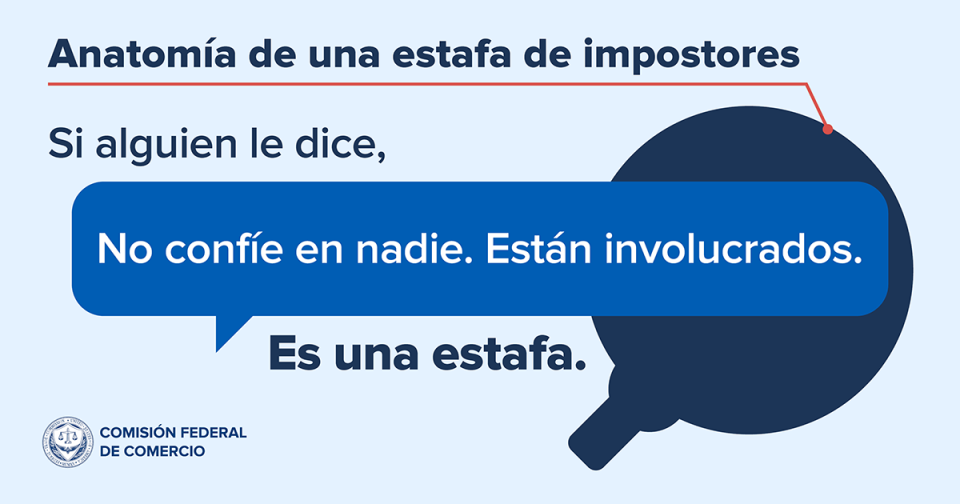
Los estafadores dicen y hacen cosas que nos pueden indicar que están mintiendo y que no son quienes fingen ser. Por supuesto que para escuchar o ver esas pistas, tenemos que superar el pánico que nos hacen sentir los estafadores, gracias a las supuestas emergencias que intentan crear. Y como los estafadores son convincentes, eso también puede ser difícil de lograr. Pero las estafas más recientes le están costando a la gente los ahorros de toda una vida, y es por eso que aquí te listamos algunas maneras seguras de detectar al estafador.
Cosas que sólo dicen los estafadores:
- “¡Actúe ya!” Eso es una estafa. Los estafadores te presionan para que no tengas tiempo de pensar. Pero la presión para actuar en el acto siempre es un signo de una estafa. Y también es un motivo para pisar el freno.
- “Sólo diga lo que yo le diga que diga”. Eso es una estafa. En el mismo minuto que alguien te diga que le mientas a otros, incluidos los cajeros del banco o los agentes de inversiones, pisa el freno. Es una estafa.
- “No confíe en nadie. Ellos están involucrados”. Eso es una estafa. Los estafadores quieren aislarte de cualquier persona que pueda frenarte.
- “Haga [esto] o lo arrestarán”. Eso es una estafa. Cualquier amenaza como ésta es una mentira. Nadie necesita que le entregues dinero o información para mantenerte fuera de la cárcel, impedir que te deporten o evitar multas más altas. Son todas estafas.
- “No cuelgue el teléfono”. Esa es una estafa. Si alguien quiere que permanezcas al teléfono mientras tú retiras o transfieres dinero, compras tarjetas de regalo o cualquier otra cosa que te pida que hagas: es un estafador. CUELGA el teléfono.
También te brindamos una lista de las cosas que únicamente los estafadores te dirán que hagas:
- “Mueva su dinero para protegerlo” es una estafa. Nadie que actúe legítimamente te dirá que transfieras o retires dinero de tus cuentas bancarias o de inversión. Pero los estafadores sí lo harán.
- “Retire dinero y compre lingotes de oro” es una estafa. Siempre. En toda ocasión.
- “Retire dinero y entrégueselo a [cualquiera]” es una estafa. Digan lo que digan: es una estafa. No se lo des a un mensajero, no lo entregues en ninguna parte, ni lo envíes. Es una estafa.
- “Vaya a un cajero ATM de Bitcoin” es una estafa. Nadie que actúe legítimamente te insistirá jamás para que obtengas criptomonedas de ninguna clase. Y no hay ninguna razón legítima para que alguien te mande a un cajero ATM de Bitcoin. Es una estafa.
- “Compre tarjetas de regalo” es una estafa. Nunca hay ningún motivo para pagar algo con una tarjeta de regalo. Y una vez que compartes los números de PIN que están al dorso de la tarjeta, tu dinero desaparece.
Si ves o escuchas cualquier versión de estas frases, acabas de detectar a un estafador. En lugar de hacer lo que dicen que hagas, pisa el freno. Cuelga el teléfono. Elimina el email. Deja de intercambiar mensajes de texto. Bloquea su número, haz lo que sea para alejarte del estafador. Y luego, cuéntaselo a alguien de tu confianza y reporta la estafa a la FTC en ReporteFraude.ftc.gov.

Nuestra serie de blogs "Anatomía de una estafa de impostores" explica cómo reconocer, evitar y denunciar a los estafadores que se hacen pasar por un negocio o por el gobierno. Lee más.
- Nunca muevas tu dinero para “protegerlo”. Eso es una estafa
- ¿Qué es un código de verificación y por qué me lo pediría alguien?
- ¿Tu banco o fondo de inversión detendrá una transferencia a un estafador? Probablemente no
- Maneras seguras de detectar a un estafador
- ¿Recibiste una llamada o mensaje de texto sobre una compra sospechosa en Amazon? Es una estafa
- Nuevos estafadores de soporte técnico que quieren quedarse con los ahorros de toda tu vida
- ¿Alguien te mandó a un cajero ATM de Bitcoin? Es una estafa FTC






.jpg)
.jpg)


